Goldenseal: worth its weight in gold
To many humans, the sea of green that is the backdrop of our lives is nothing more than a verdant smorgasbord of unknown plants that die back at winter. To others, a handful stick out and to still more, plants are not a backdrop at all, but a host of lively relationships supporting and enhancing human life. @mountainjewel, it is our mission in life to help bridge that plant-human bond.
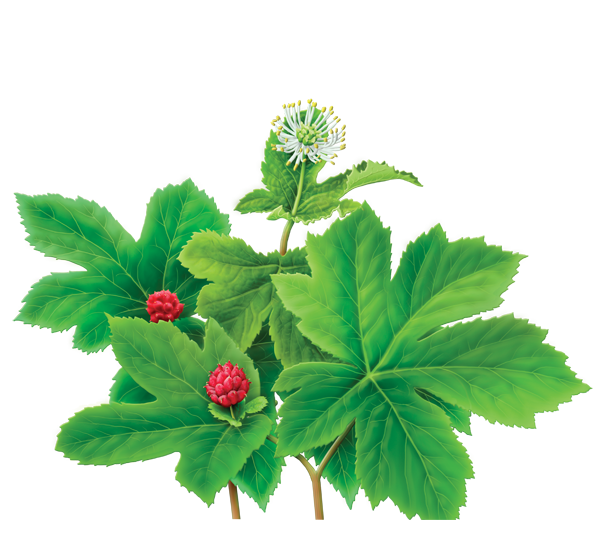
Goldenseal in flower and with fleshy seeds
Today we are going to go through a favorite plant and one that has an important place in history reaching to the present day. It is a plant that has no doubt saved lives and helped many get well, caused controversy, been fought over and stolen, lauded as a cure-all and still to this day continues to be an ally to many.

Goldenseal
Hydrastis Canadensis
Goes by many names. Some of them include,
Yellow Puccoon, Ohio curcuma, Eye balm, Ground Raspberry, Indian Turmeric, Jaundice Root, Yellow Eye, Indian paint.
It’s a plant that grows all throughout the Midwest & eastern parts of North America (see map below).
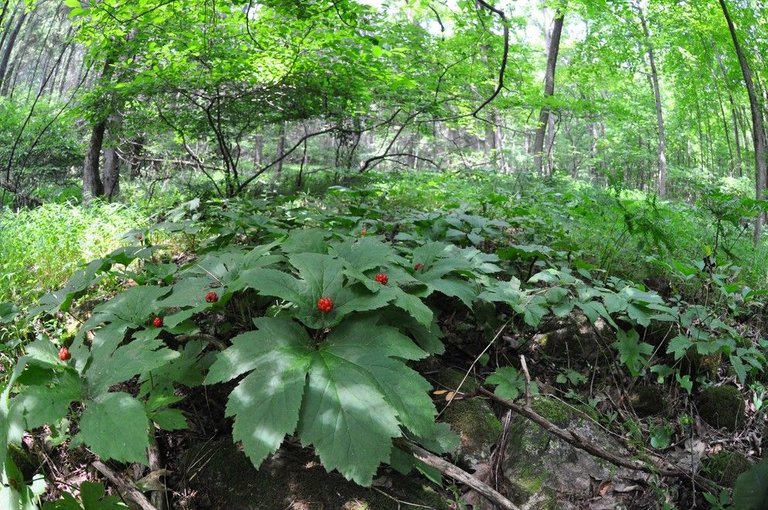
Goldenseal in the woods
The Native Americans that used to inhabit those lands including the Anishnaabe, Crow, Cherokee, Meskwaki, Seminole and Blackfoot used what they called Yellow Puccoon in a variety of ways. It was an important herb in their materia medica. They used it for:
Acne, pelvic bleeding, catarrh, skin cancer, dye for clothing, skin ulcers, eczema, sore or inflamed eyes, indigestion, wound-healing, liver problems.
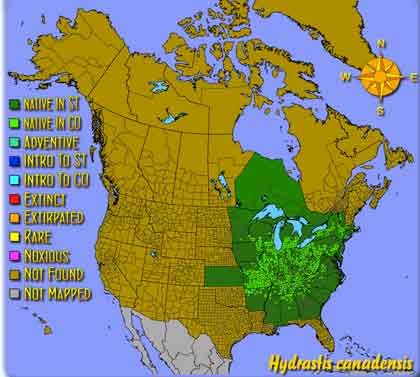
Range Map
When the colonizers came, the herb continued to be a favorite. The leading healing professions of the day, namely the Thompsonian Herbalists, Homeopathic Practitioners and the Eclectics, used it as a cure-all and boosted its fame throughout the world. It became a Very Important Herb to such an extent that it was overharvested.
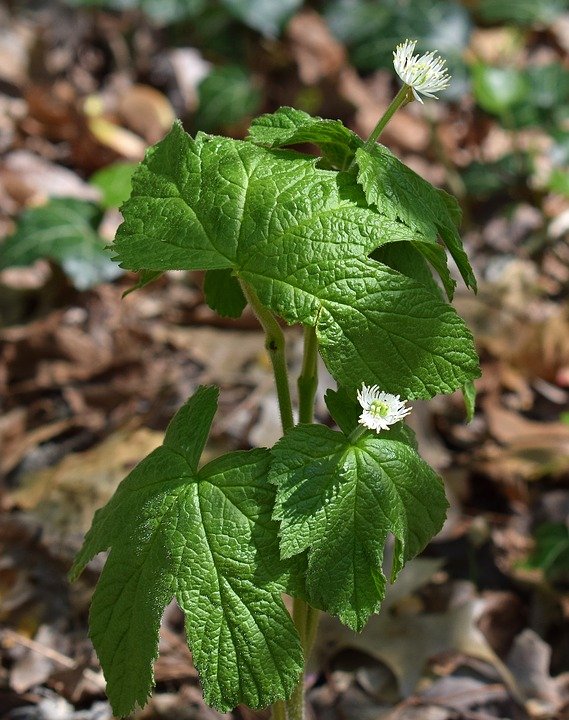
Pixabay
Overharvested
Goldenseal, because of its reputation as a cure-all and due to a misinformation that it can help one receive a negative on a drug test, has caused much of it to be overharvested from the wild.
Wild populations, if not tended, of course cannot withstand the pressure this type of harvesting puts on them. This had led to state laws and regulations being put in place, including a fine if wildharvested on public land. Because of this and the amount of this root desired from the public, it has become an important crop for cultivation bringing the grower ample money. We suggest always getting your goldenseal medicine from a trusted grower and not taking any from the wild, unless it's on a wild stand of someone you know or your own land and you're actively tending it by reseeding the berries as you harvest.
Organic Wild-Simulated Cultivation
The main point to consider here is that goldenseal has not been domesticated. The cultivation of goldenseal is achieved through propagating wild plants. In this method we are simulating its natural conditions, the most important of which is shade.
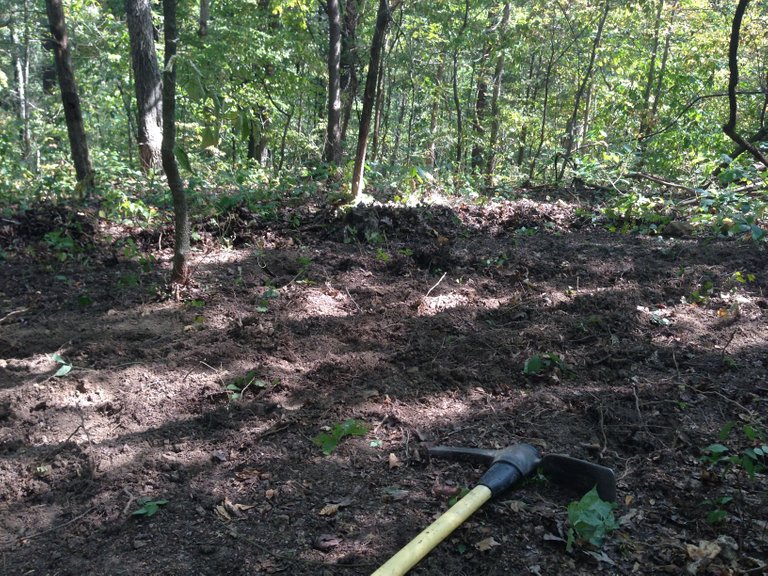
Preparing the space for planting
Fertilizers and soil amendments are not needed and intensive soil preparation is unnecessary. Shade, mulch and moisture are most important elements and you’ll often find it growing in shady streamside locations in the wild. We grow our plants on a north-facing slope amidst paw paws, pines and white oaks. We chose this because this is a site that meets goldenseal’s needs and mimics its natural habitat. We use the natural forest duff as mulch and dug furrows to plant roots in which we covered up with existing soil. Many folks also plant in fields using shade cloth to provide the necessary protection from the sun if they don’t have a shady forest to plant in. Some reports claim that goldenseal likes 60-80% shade habitat.
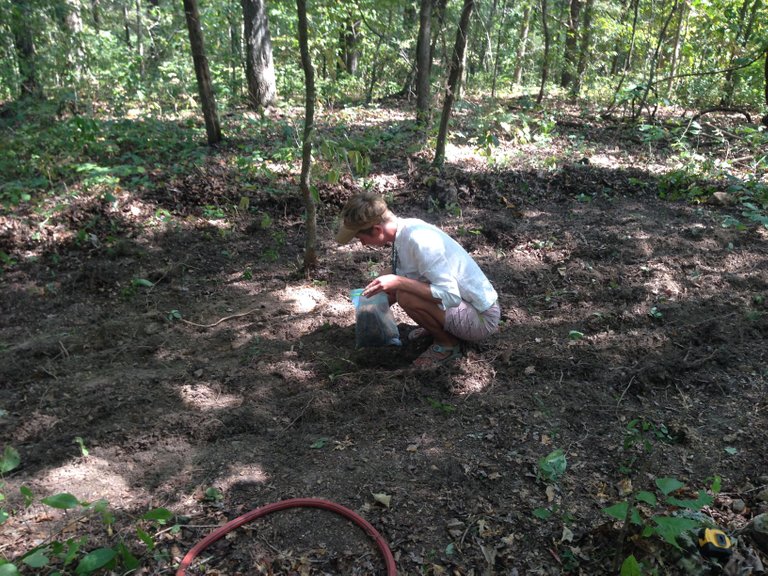
Planting the goldenseal rhizomes
Uses
The Eclectic physicians of the 19th century in the United States crowned goldenseal the King and Queen of herbs. The Kings aspect relates to its action as a digestive tonic (which many other bitter herbs do too, many of these are yellow in nature like goldenseal and are known to stimulate bile), while the Queen aspect refers to the tonifying effects on the mucous membranes. Very few other plants combine these properties, one very special thing that goldenseal offers.
Dr. Edwin Hale, a doctor of Homeopathy, was the first to prove goldenseal’s reported uses. He did extensive research and reported his findings in comprehensive studies. His work is especially valuable as the modern allopathic medical system has never taken to using goldenseal as a medicine and thus hasn’t studied it.
Improving digestive system
The bitter taste in plants is responsible for secretion of bile, which is essential for proper digestion and assimilation. In many cases of weakness and low vitality there is a direct correlation to poor digestion. Goldenseal in low doses can stimulate and drastically improve digestion.
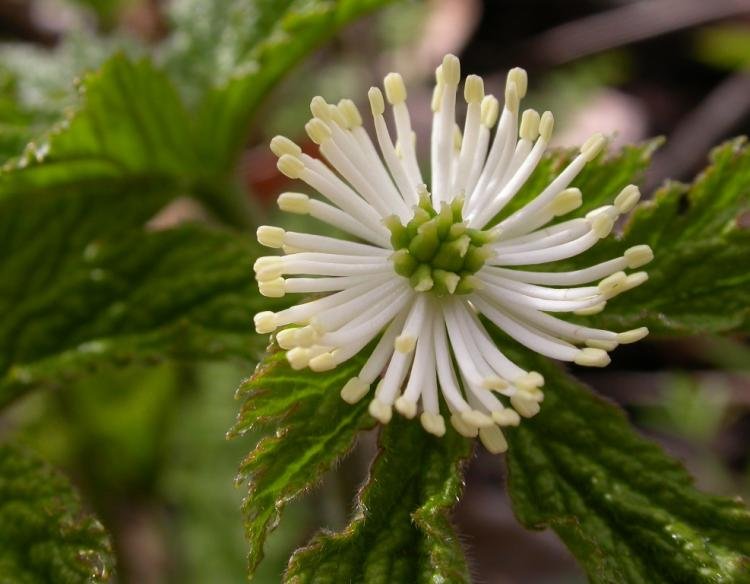
Goldenseal flower
Mucous membrane tonic
The Mucus secretions in our bodies are important aspects of the immune system and move a lot throughout the body. Mucous protects sensitive areas like the eyes, ears and nose, while transporting important cargo like antibodies. When we fall ill, we see mucous as a negative thing, but in fact we need and want mucous to flow freely in these cases. What happens during an infection such as a cold or flu is that mucous becomes stagnant. This impedes the natural process of elimination and halts the delivery of fresh antibodies. Goldenseal is known to support mucous in the body and at a certain stage in the cold will help to dry it out. This makes goldenseal an invaluable medicine during the later stages of the cold when a lot of the sickness has already moved through and it is time to tonify and dry out the mucous membranes. Goldenseal can help in the early stages of a cold, but it’s really good to let the mucous flow during these times so it’s best to use it a little later on.
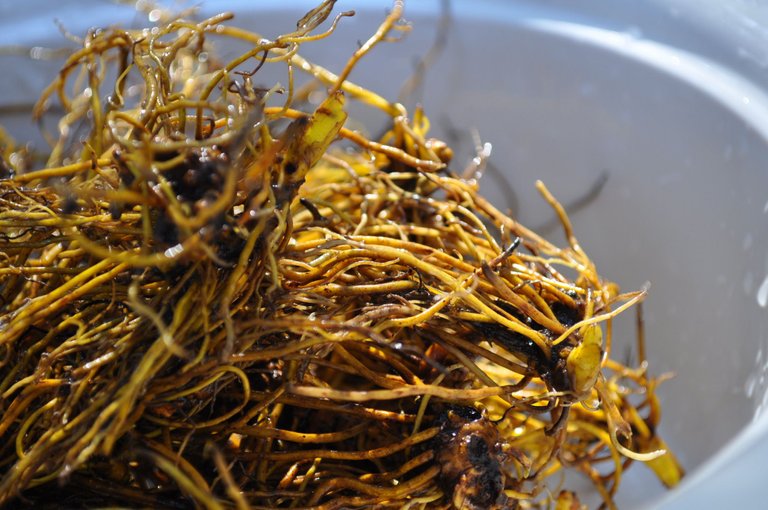
You can see why it is called goldeseal or yellow root.
Natural Antibiotic
Little modern scientific study has been conducted on goldenseal as a plant. Rather hydrastine and berberine (alkaloids both present in goldenseal) have been isolated and experimented with. This is important to note because the whole herbs has a complex and intelligent arrangement of alkaloids and other constituents that are in concert to support our immunity.
What we are sure of is that it has a proven history of use as a great tool against bacterial infections, internally and externally. It is not an effective systemic antibiotic, as the GI tract does not allow compounds to enter the blood. It is, however, an excellent treatment for persistent infections of the eyes, ears, respiratory tract, urinary tract and for gynecological infections.
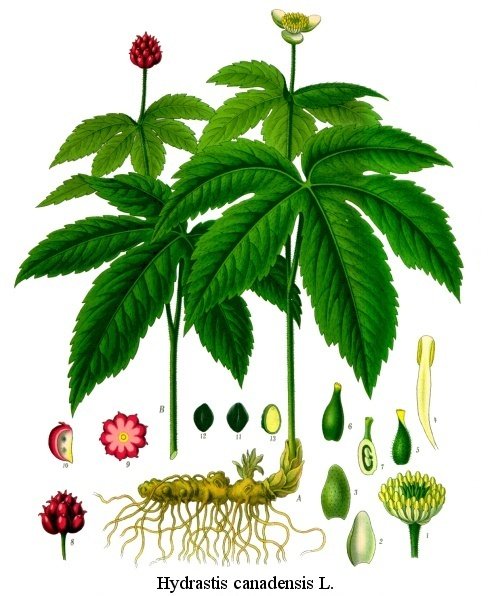
Goldenseal Illustration
Powders
A powder can be made from dried roots to be used a wound powder (to staunch bleeding and kill bacteria) or to be made into a dilute to wash infected areas with. You could also use this as a yellow dye, but due to its sensitive status, there are likely other yellow dye plants that would suffice.

How to Make an Herbal Tincture
A tincture is one of the easiest ways to use this herb in daily life. Like all tinctures, the plant part is infused in high proof alcohol for a certain length of time, usually 6 weeks at minimum.
First obviously acquire recently dug mature roots (1-2 years old) from a sustainably grown source. We did a work trade for these from a nearby farmer friend of ours who has been growing goldenseal (and many other plants) for over 40 years on her land. She grows it to sell cuttings (to be planted) that are sold from a larger trustworthy distributor.
We washed the roots gently in running water.
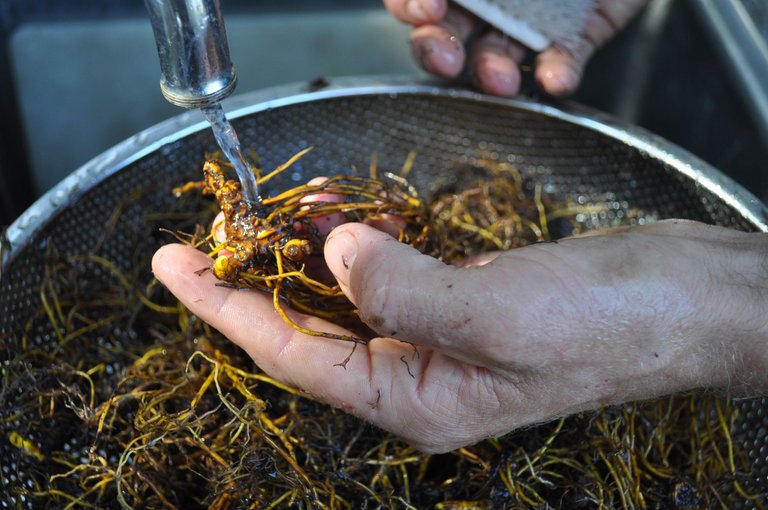
Next, we prepared the ingredients and decided ratios and amounts.
The alcohol I have is 190 proof (95% alcohol) so we diluted it to 75% alcohol solution (herbs have water and alcohol soluble constituents, so we added some water to account for those that are extracted by water).
At this point, we ground the root up in our MagicBullet Blender, adding small amounts of the liquid solution for easier blending, and put it all together in a large container.
It’s very important to Label the medicine right away, as it’s too easy to forget the details later on. I always include Date, Name (including Latin) of the medicine(s), % Alcohol and ratio of herb to liquid. In this case we did 3:1 (water:herb). If the herb is fresh or if a leaf or berry is used instead of a root, this ratio changes.
After two moon cycles in a cool, dark place, I consider the herb well tinctured (though many say 6 weeks is sufficient, I like to give my plants more time) and one can strain the herb from the alcohol. You’re left with just the liquid which contains the medicinal components of the plant. Store it in a dark place and when putting it in smaller bottles for everyday use, make sure they are dark glass (blue or amber).
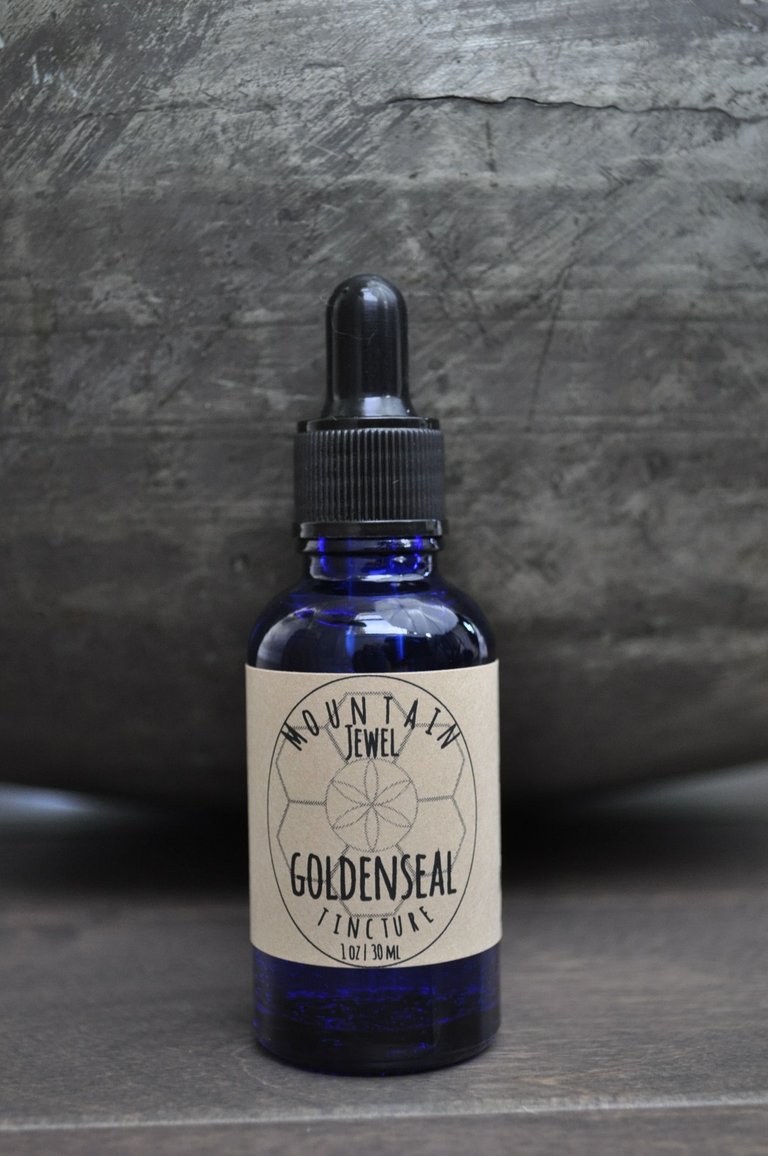
Shameless plug for our biodynamic and organically cultivated Hydrastis canadensis root tinctured in organic alcohol!
As always, if you have any questions, want to share your own experience or something we left out, feel free to leave a comment! We love engaging in the comment section. Thanks and I hope you found this helpful!

Hmm, this is one that I haven't found growing around here in NS, doesn't seem to be on your map either. I wonder if I could grow it here though? Would be great to put in my Nova Scotia Materia Medica. I have used it in it's powdered form before, such a powerful medicine. Great write up :)
yes i am guessing alongside you that it doesn't grow that far north. thanks! would love to hear about some plants in your Novia Scotia M.M... I love learning about plants from all over and each place has its unique allies. <3
I love learning about this kind of thing, even though healing and herbs are not my gift. Here in Nevada such herbs as this do not exist, but we do have juniper berries, thistle, and remarkably down by the river last year I found wild truffles. (Most of our rivers here would be streams elsewhere).
Coincidentally, I used Goldenseal on a bit of a wound just the other day.
Thanks for the post. Blessings.
oh wow, wild truffles- what a treat! yes, each place/region has its own herbs. the people who inhabited these lands long before we were ever a thought, knew how to speak the languages of all of the plants and likely wouldn't have told you they went without anything. obviously there are extra special plants and trade has always been a thing, but there are wonderful "superplants" everywhere - it's just a matter of speaking their language. thanks for stopping by and glad to hear you used goldenseal just the other day. blessings.
It's to see you share how to make an herbal tincture.. Here in Nigeria, people who live in the village do not joke with herbs and that's why the love longer than people in the city
Herbs are very good.. It's a natural way of curing diseases
Yes exactly. glad to hear where you live that there is still a great tradition of using herbs for health and curing. best to you from the US.
Thanks for sharing this information.We can cure many diseases by growing the green plants and vegetables.I try my best to include lot of greens in my diet:)
that's great. greens in the diet are one of the best ways to stay healthy :) thanks for stopping by.
Thanks for this. My wife and I were just discussing growing goldenseal after first looking into ginseng. I believe this is a better choice for us as it takes much less time to harvest and has many of the same benefits.
You're welcome! Yes, it's a great choice for the homesteader in these regions. My friend who has been growing it for decades also recommended it above ginseng for the reasons you listed, although ginseng is a much more powerful immune system tonic. goldenseal, while also an immune booster, shouldn't be taken for long periods like ginseng should. it's more of a stimulator and not a long term tonic.
I have not seen goldenseal growing anywhere in Central America. So, I don't think it is one I can cultivate on the homestead. :{
yes it doesn't grow natively in your environment and i'm not sure it would do well in a tropical setting. berberine, it's main active constituent, is found in plants throughout the world however. i'll keep an eye out for ones that grow in your area. Here's a wiki article on it.
Thanks. I will go and read the article now...
According to the map you shared, this is native in my area. I will have to watch for it come spring time when we go on longer walks and visit the 900-acre state land nearby.
I have an experiment for the Goldenseal tincture I received from you last week. I'll be sharing in my Wednesday edition of Kitchen Happenings this week.
yes! you'll know it by the bright white flower during that period. it can be easier to sight in fall when the berries come out if you're new to locating it. as mentioned, search near waterways. It grows in similar habitat as morels, paw paws, mayapples and the like...
Ooooh excited to hear of your experiment :D
A well-researched and informative post.
Overharvested due to a reputation for beating drug tests - does this mean that individual drug users are traipsing through the woods looking to make some powder, or is it companies looking to sell to the drug users?
Also, you mention that it has that reputation, but you don't weigh in on its actual effectiveness in that regard. Any definitive proof on that? I'm asking for a friend!
haha i think people have overharvested it from the wild in an effort to sell based on the purported drug test benefits. i think mainly people read the misinformation online and buy from the many online retailers available.
as for it's uses, i have personally used it to great affect for the above-mentioned mucous relief in later stage of a cold and also as an immune booster and digestive tonic. i can speak to all of those benefits! we've also used it with great success to aid in relieving painful poison ivy rash (used as a topical wash in this instance). I can't speak to any of the other claims, but I have researched this medicine extensively and trust many of the herbal sources i've read. A lot of this information is from Paul Bergner's Healing Power of Echinacea and Goldenseal. Hope this helps!
Oh and I just reread your comment- per reputation and effects are you referring to use as a drug masker in testing-- haha i just gave you another plant profile! It is ineffective in terms of masking drug tests (for a friend ;) lol!)
Great post will be adding a few of these to our permaculture farm in the near future. Only ever seen one in the wild in Ontario Canada.
thanks! awesome! glad to hear you'll be adding to your permaculture farm. Interesting to note you've only seen one in the wild. Perhaps wild populations have always been minimal or it's an effect from overharvesting.
From what I read its from overharvesting.
Awesome post! Really interested in ginseng and goldenseal for the future! Resteemed!
Thanks for the resteem. There's for sure a lot of potential for these two woodland species.
That was a very informative read on the goldenseal. I don't know that we have it in my woods, but I am going to go foraging to see if I can find some. I would love to make a tea from the roots to use in my handmade soaps. I think it would be a great antibacterial additive for problem skin, perhaps like extreme eczema. I would love to try it in soap or a butter balm for infected skin. What do you think? Any thoughts whether I should do so. Would love your feedback.
Best of luck finding it. If you do, be sure to understand the implications of harvesting a potential species at risk.
Your ideas on soaps and salves are sound, I’d like to see the products. I Many folks sell cultivated roots, and it’s not tough to grow yourself if you did want to make the soap, I think you’re onto something here. My only concern would be the tint it may leave.
Best of luck.